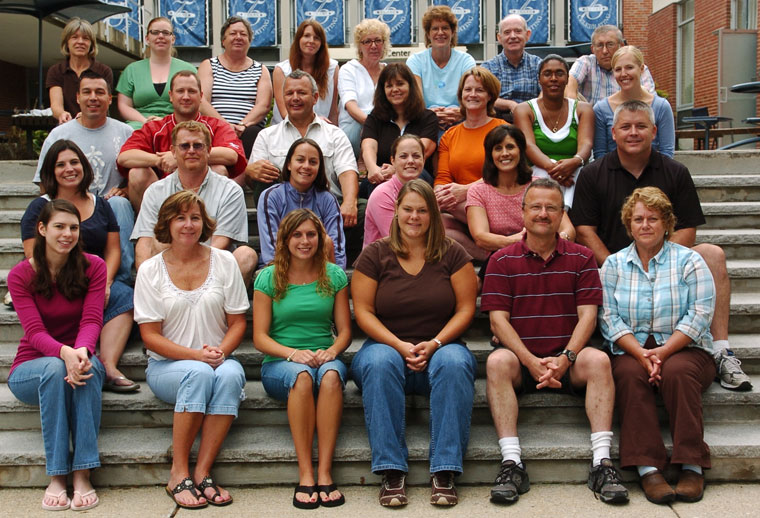Grant supports teacher education in inquiry-based science
Five-day Summer Science Institute at Rivier College is part of a two-year project: Developing a Cadre of Teacher-Leaders in Elementary Science.

Teachers from seven New Hampshire school districts participated in a Summer Science Institute at Rivier College, where they developed inquiry-based science lessons to use in their classes this fall. Row 1: (Front, from left) Laurel Plouffe '08 (Pelham), Paula Burke (Nashua), Erin Ferland (Rochester), Jen Hedman '07G (Rochester), Randy Calhoun (Nashua), Joan Troup (Hudson) Row 2: Jessica Payeur (Londonderry), Rick Lydon (Nashua), Karen Broderick (Rochester), Sacha Norris (Brookline), Lisa Lindsay '93/'05G (Brookline), Eric Crivac '06G (Hudson) Row 3: Jim Paiva '98G (Londonderry), Josh Bremberg (Londonderry), Tom Muzzey (Rochester), Virginia Farkas (Rochester), Judy Sidileau (Mascenic), Sandra Mack '03G (Londonderry), Katie Ditolla (Hudson) Row 4: Fiona McDonnell (Rivier College), Alicia Ronayne (Londonderry), Carlene Eneguess (Hudson), Cat Kolar (Hudson), Patricia Laws '87 (Hudson), Rebecca Cummings (Pelham), David Burgess (Rivier College), Mike Kramer (Mascenic).
Nashua, NH—Working to improve their craft, a group of 27 educators from school districts around New Hampshire met at Rivier College in Nashua, New Hampshire for five days in August. Throughout the five-day Summer Science Institute, they solidified their understanding of inquiry science practices and developed inquiry-based science lessons for use in New Hampshire schools this fall.
The institute included teachers from seven school districts: Nashua, Hudson, Londonderry, Rochester, Pelham, Mascenic, and Brookline.
The Summer Science Institute was supported by a competitive grant from the U.S. Department of Education and New Hampshire Department of Education. This is the second year Rivier has received the Mathematics Science Partnership Grant to fund the project "Developing a Cadre of Teacher-Leaders in Elementary Science." During the first year of the program, teachers focused on content and mentoring; this year, they will develop and implement curricula then evaluate student learning.
"Inquiry-based science encourages the learner to play a key role in their daily learning and the teacher to be a facilitator of that learning. Inquiry science promotes student engagement, allows time for exploration, encourages student-generated questions, makes connections to their own world, and finally evaluates what they have learned," says Eric Crivac, one of the participating teachers.
As educators strive to maintain a learning environment where students are challenged and motivated, this group is uniquely positioned to bring dynamic lessons into the classroom, thereby creating a larger, more diverse pool of students with an interest in science.
For further information on this group and their work, please contact Dr. Fiona McDonnell or Dr. David Burgess at fmcdonell@rivier.edu or dburgess@rivier.edu.